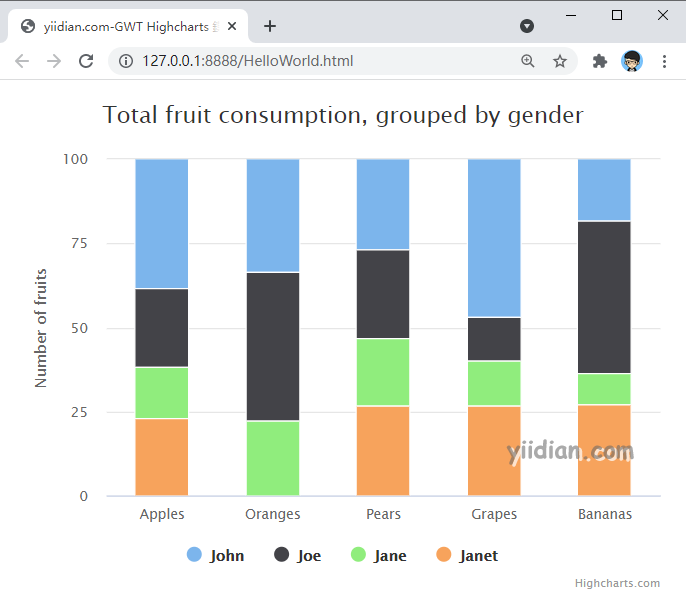GWT Highcharts 带有百分比的堆积柱状图
GWT Highcharts 带有百分比的堆积柱状图 介绍
我们已经在《GWT Highcharts 入门案例》一章中看到了用于绘制此图表的步骤。现在让我们考虑以下示例以进一步了解带有百分比的堆积柱状图。
绘图选项
plotOptions 是每个系列类型的配置对象的包装对象。每个系列的配置对象也可以被系列数组中给定的每个系列项目覆盖。这是为了将每个系列的值堆叠在一起。这是为了将每个系列的值堆叠在一起。
使用 plotOptions.column.stacking 将图表的堆叠配置为“percent”。可能的值为 null 禁用堆叠,“normal”按值堆叠,“percent”按百分比堆叠图表。
chart.setColumnPlotOptions(new ColumnPlotOptions()
.setStacking(Stacking.PERCENT)
);
GWT Highcharts 带有百分比的堆积柱状图 示例
package com.yiidian.helloWorld.client;
import com.google.gwt.core.client.EntryPoint;
import com.google.gwt.user.client.ui.RootPanel;
import org.moxieapps.gwt.highcharts.client.*;
import org.moxieapps.gwt.highcharts.client.labels.DataLabels;
import org.moxieapps.gwt.highcharts.client.plotOptions.ColumnPlotOptions;
import org.moxieapps.gwt.highcharts.client.plotOptions.PlotOptions;
import org.moxieapps.gwt.highcharts.client.plotOptions.SeriesPlotOptions;
public class HelloWorld implements EntryPoint {
public void onModuleLoad() {
final Chart chart = new Chart()
.setType(Series.Type.COLUMN)
.setChartTitleText("Total fruit consumption, grouped by gender")
.setColumnPlotOptions(new ColumnPlotOptions()
.setStacking(PlotOptions.Stacking.PERCENT)
)
.setToolTip(new ToolTip()
.setFormatter(new ToolTipFormatter() {
@Override
public String format(ToolTipData toolTipData) {
return toolTipData.getSeriesName() + ": " + toolTipData.getYAsLong() +
" ("+ Math.round(toolTipData.getPercentage()) + "%)";
}
})
);
chart.getXAxis()
.setCategories("Apples", "Oranges", "Pears", "Grapes", "Bananas");
chart.getYAxis()
.setAllowDecimals(false)
.setMin(0)
.setAxisTitleText("Number of fruits");
chart.addSeries(chart.createSeries()
.setName("John")
.setPoints(new Number[] {5, 3, 4, 7, 2})
);
chart.addSeries(chart.createSeries()
.setName("Joe")
.setPoints(new Number[] {3, 4, 4, 2, 5})
);
chart.addSeries(chart.createSeries()
.setName("Jane")
.setPoints(new Number[] {2, 2, 3, 2, 1})
);
chart.addSeries(chart.createSeries()
.setName("Janet")
.setPoints(new Number[] {3, 0, 4, 4, 3})
);
RootPanel.get().add(chart);
}
}
输出结果为:

热门文章
优秀文章


